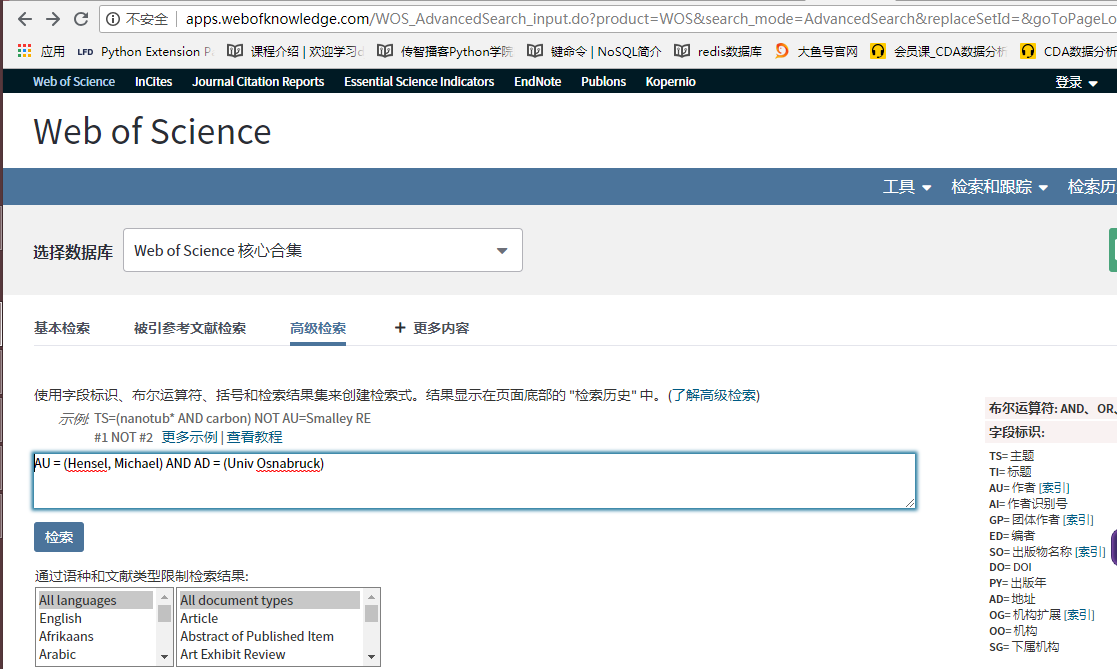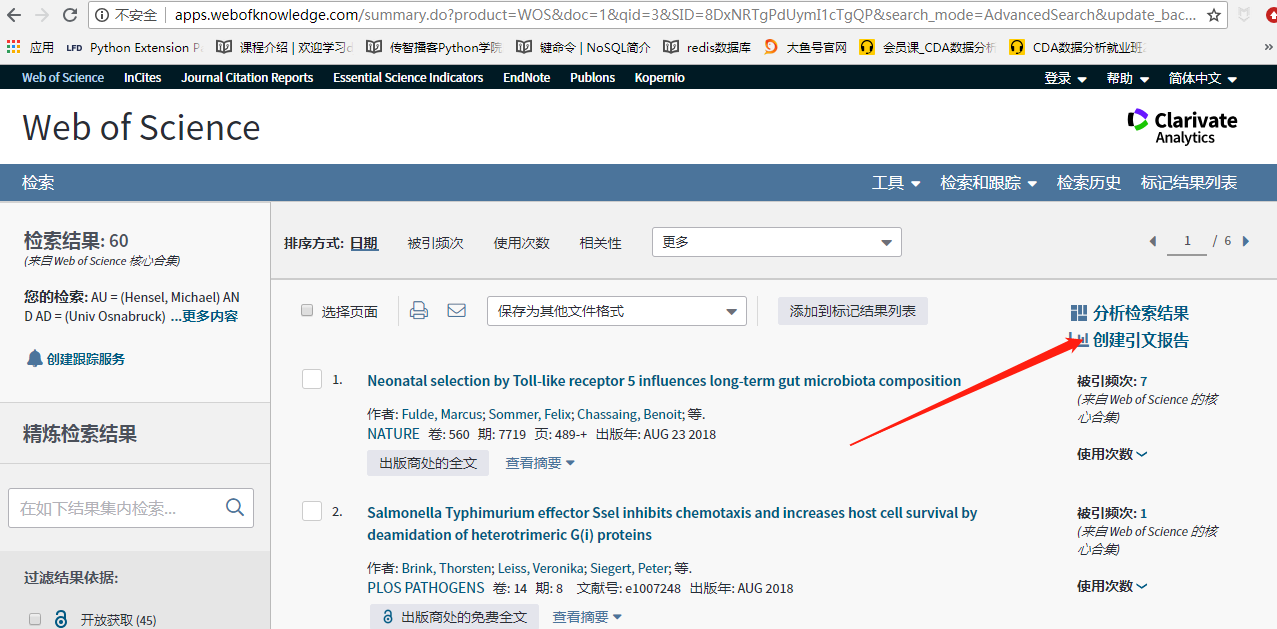目标网站分析




我们要获取的就是这几个数值
程序实现
# -*- coding: utf-8 -*-
"""
@Datetime: 2019/2/28
@Author: Zhang Yafei
"""
# pip install -i https://pypi.tuna.tsinghua.edu.cn/simple xlrd selenium numpy pandas
import os
import random
import re
import time
from concurrent.futures import ThreadPoolExecutor
import numpy as np
import pandas as pd
import xlrd
from selenium import webdriver
# file_name = 'first_author.csv'
file_name = 'corr_author.csv'
def filter_rule(has_rule_list, author_type):
if author_type == 'first':
df = pd.read_csv('first.csv')
elif author_type == 'corr':
df = pd.read_csv('corr.csv')
rules = df.rules.tolist()
print('总共:{} 下载完成: {}'.format(len(set(rules)), len(set(has_rule_list))))
result_rule = set(rules) - set(has_rule_list)
print('还剩:{}'.format(len(result_rule)))
return list(result_rule)
class WebOfScience(object):
""" web od science 被引信息下载 """
def __init__(self):
self.driver = webdriver.Chrome()
self.num = 0
self.root_url = 'http://apps.webofknowledge.com'
def get_h_index(self, rule):
self.num += 1
try:
wait_time = random.randint(3, 10)
time.sleep(wait_time)
select_id = '#set_{}_div a'.format(self.num)
self.driver.get(self.root_url)
self.driver.find_element_by_xpath('/html/body/div[9]/div/ul/li[3]/a').click()
self.driver.find_element_by_id('value(input1)').clear()
self.driver.find_element_by_id('value(input1)').send_keys(rule)
self.driver.find_element_by_css_selector('#search-button').click()
self.driver.find_element_by_css_selector(select_id).click()
self.driver.find_element_by_css_selector(
'#view_citation_report_image_placeholder > div > div > a > span').click()
chuban_sum = self.driver.find_element_by_xpath('//*[@id="piChart-container"]/div/div[1]/div[1]/em').text
h_index = self.driver.find_element_by_id('H_INDEX').text
beiyin_sum = self.driver.find_element_by_xpath(
'//*[@id="citation-report-display"]/table/tbody/tr[2]/td[3]/div/em[1]').text
shiyin_wenxian = self.driver.find_element_by_css_selector(
'#citation-report-display > table > tbody > tr:nth-child(2) > td:nth-child(4) > div > div:nth-child(2) > a.linkadjuster.snowplow-cited-rep-total-citing-articles > em').text
meixiang_yinyong = self.driver.find_element_by_xpath(
'//*[@id="citation-report-display"]/table/tbody/tr[2]/td[2]/div/em[2]').text
quchu_ziyin = self.driver.find_element_by_xpath(
'//*[@id="citation-report-display"]/table/tbody/tr[2]/td[3]/div/em[2]').text
quchu_ziyin_fenxi = self.driver.find_element_by_xpath(
'//*[@id="citation-report-display"]/table/tbody/tr[2]/td[4]/div/div[2]/a[1]/em').text
data_dict = {'rules': [rule], 'chuban_sum': [chuban_sum], 'h_index': [h_index], 'beiyin_sum': [beiyin_sum],
'shiyin_wenxian': [shiyin_wenxian], 'meixiang_yinyong': [meixiang_yinyong],
'quchu_ziyin': [quchu_ziyin], 'quchu_ziyin_fenxi': [quchu_ziyin_fenxi]}
# data_list = [{'rule': rule,'chuban_sum': chuban_sum,'h_index': h_index,'beiyin_sum': beiyin_sum,'shiyin_wenxian': shiyin_wenxian,'meixiang_yinyong': meixiang_yinyong,'quchu_ziyin': quchu_ziyin,'quchu_ziyin_fenxi': quchu_ziyin_fenxi}]
df = pd.DataFrame(data=data_dict)
df.to_csv(file_name, index=False, header=False, mode='a+')
print('{0} {1} {2} {3} {4} {5} {6} {7} 下载完成'.format(rule, chuban_sum, h_index, beiyin_sum,
shiyin_wenxian, meixiang_yinyong, quchu_ziyin,
quchu_ziyin_fenxi))
except Exception as e:
print(e)
print(rule, '异常,正在重新下载')
wait_time = random.randint(3, 20)
time.sleep(wait_time)
self.get_h_index()
def read_example_data():
data = xlrd.open_workbook('example.xlsx')
table = data.sheets()[0]
nrows = table.nrows
ncols = table.ncols
search_rules = []
for row in range(nrows):
name = table.cell(row, 0).value
org = table.cell(row, 1).value
search_rule = 'AU = ({0}) AND AD = ({1})'.format(name, org)
search_rules.append(search_rule)
return search_rules
def extract_first_author(row):
try:
authors = re.match('[(.*?)]', row.作者机构).group(1)
first_author = authors.split(';')[0]
first_author_org = re.findall('](.*?),', row.作者机构)[0]
# print(first_author, '-', first_author_org)
except AttributeError:
first_author = np.NAN
first_author_org = np.NAN
first_author_rule = 'AU = ({0}) AND AD = ({1})'.format(first_author, first_author_org)
return first_author_rule
def extract_reprint_author(row):
try:
reprint_authors = row['通讯作者/机构']
reprint_author = re.findall('(.*?) (reprint author), (.*?),', reprint_authors)[0][0]
reprint_author_org = re.findall('(.*?) (reprint author), (.*?),', reprint_authors)[0][1]
# print(reprint_author, '-', reprint_author_org)
except TypeError:
reprint_author = np.NAN
reprint_author_org = np.NAN
reprint_author_rule = 'AU = ({0}) AND AD = ({1})'.format(reprint_author, reprint_author_org)
return reprint_author_rule
def run(rule):
web = WebOfScience()
web.get_h_index(rule)
web.driver.close()
if __name__ == '__main__':
# 0. 读取作者和机构信息,组成检索式
def make_rule(row):
"""
根据作者和机构构造检索式
:param row:
:return: rule 检索式
"""
words = set(row.orgs.split(';'))
AD = ' OR '.join(words)
rule = 'AU = ({0}) AND AD = ({1})'.format(row.author, AD)
return rule
# df_first = pd.read_csv('firstauthor.txt', sep=' ', names=['DOI','author','orgs'])
# df_corr = pd.read_csv('corresponding.txt', sep=' ', names=['DOI','author','orgs'])
# rules = df_first.apply(make_rule, axis=1)
# rules = df_corr.apply(make_rule, axis=1).tolist()
# df_first['rules'] = rules
# df_corr['rules'] = rules
# if not os.path.exists('first.csv'):
# df_first.to_csv('first.csv')
# if not os.path.exists('corr.csv'):
# df_corr.to_csv('corr.csv')
# 2.根据检索式下载数据,并在每次运行之前过滤数据
# first_author = pd.read_csv(file_name)
# rule_list = first_author.rules.tolist()
corr_author = pd.read_csv(file_name)
rule_list = corr_author.rules.tolist()
if os.path.exists(file_name):
rule_list = filter_rule(has_rule_list=rule_list, author_type='corr')
# columns = ['rules', 'chuban_sum', 'h_index', 'beiyin_sum', 'shiyin_wenxian', 'meixiang_yinyong', 'quchu_ziyin', 'quchu_ziyin_fenxi']
# if not os.path.exists(file_name):
# data = pd.DataFrame(columns=columns)
# data.to_csv(file_name, index=False, mode='a')
# 3. 多线程下载
pool = ThreadPoolExecutor(5)
pool.map(run, rule_list)
pool.shutdown()
# 4. 合并第一作者数据表
# first = pd.read_csv('first.csv')
#
# data1 = pd.read_csv('data/first_0_1500.csv', encoding='utf-8')
# data2 = pd.read_csv('data/first_1500_3000.csv', encoding='utf-8')
# data3 = pd.read_csv('data/first_3000_4500.csv', encoding='utf-8')
# data4 = pd.read_csv('data/first_4500_8200.csv', encoding='utf-8')
#
# first_concat = pd.concat([data1, data2, data3, data4], ignore_index=True)
#
# rule_list = first.rules.tolist()
# not_rules = set(first.rules.tolist()) - set(first_concat.rules.tolist())
#
# def judge_rule(row):
# return row.rules in rule_list
#
# has_bool = first_concat.apply(judge_rule, axis=1)
#
# has_first = first_concat.loc[has_bool, :]
#
# has_first.to_csv('first_author.csv', index=False)
# 5. 合并通讯作者数据表
# corr = pd.read_csv('corr.csv')
#
# data1 = pd.read_csv('data/corr_data1.csv', encoding='utf-8')
# data2 = pd.read_csv('data/corr_data2.csv', encoding='utf-8')
# data3 = pd.read_csv('data/corr_data3.csv', encoding='utf-8')
# data4 = pd.read_csv('data/corr_data4.csv', encoding='utf-8')
#
# hash_columns = {'rules':'beiyin_sum', 'beiyin_sum': 'meixiang_yinyong', 'shiyin_wenxian': 'quchu_ziyin','meixiang_yinyong':'quchu_ziyin_fenxi', 'quchu_ziyin': 'rules', 'quchu_ziyin_fenxi': 'shiyin_wenxian'}
# data2.rename(columns=hash_columns, inplace=True)
# data3.rename(columns=hash_columns, inplace=True)
#
# corr_concat = pd.concat([data1, data2, data3, data4], ignore_index=True)
#
# rule_list = corr.rules.tolist()
# not_rules = set(corr.rules.tolist()) - set(corr_concat.rules.tolist())
#
# 过滤出已经下载的检索式
# has_bool = corr_concat.apply(lambda row: row.rules in rule_list, axis=1)
# has_corr = corr_concat.loc[has_bool, :]
#
# columns = ['rules', 'chuban_sum', 'h_index', 'beiyin_sum', 'shiyin_wenxian', 'meixiang_yinyong', 'quchu_ziyin', 'quchu_ziyin_fenxi']
# has_corr = has_corr.loc[:, columns]
#
# has_corr.to_csv('corr_author.csv', index=False)
# 6. 将下载的数据信息(第一作者)合并到数据表
# first_data = pd.read_csv('first.csv')
#
# result_data = pd.read_csv('first_author.csv')
#
# first_data['出版物总数'] = np.NAN
# first_data['被引频次总计'] = np.NAN
# first_data['施引文献'] = np.NAN
# first_data['第一作者H指数'] = np.NAN
# first_data['每项平均引用次数'] = np.NAN
# first_data['去除自引'] = np.NAN
# first_data['去除自引(分析)'] = np.NAN
#
#
# def merge_data(row):
# """
# 合并数据表
# :param row:
# :return:
# """
# first_data.loc[first_data.rules == row.rules, '出版物总数'] = row.chuban_sum
# first_data.loc[first_data.rules == row.rules, '第一作者H指数'] = row.h_index
# first_data.loc[first_data.rules == row.rules, '被引频次总计'] = row.beiyin_sum
# first_data.loc[first_data.rules == row.rules, '施引文献'] = row.shiyin_wenxian
# first_data.loc[first_data.rules == row.rules, '每项平均引用次数'] = row.meixiang_yinyong
# first_data.loc[first_data.rules == row.rules, '去除自引'] = row.quchu_ziyin
# first_data.loc[first_data.rules == row.rules, '去除自引(分析)'] = row.quchu_ziyin_fenxi
#
#
# result_data.apply(merge_data, axis=1)
#
# # 删除多列
# # del_columns = ['Unnamed: 0', '出版物总数', '被引频次总计', '施引文献', '每项平均引用次数', '去除自引', '去除自引(分析)']
# # first_data = first_data.drop(del_columns, axis=1)
#
# columns = ['DOI', 'author', 'orgs', 'rules', '第一作者H指数', '出版物总数', '被引频次总计', '施引文献', '每项平均引用次数', '去除自引', '去除自引(分析)']
# first_data.columns = columns
#
# writer = pd.ExcelWriter('first_author_result.xlsx')
# first_data.to_excel(writer, 'table', index=False)
# writer.save()
# 7. 将下载的数据信息(通讯作者)合并到数据表
corr_data = pd.read_csv('corr.csv')
result_data = pd.read_csv('corr_author.csv')
corr_data['出版物总数'] = np.NAN
corr_data['被引频次总计'] = np.NAN
corr_data['施引文献'] = np.NAN
corr_data['第一作者H指数'] = np.NAN
corr_data['每项平均引用次数'] = np.NAN
corr_data['去除自引'] = np.NAN
corr_data['去除自引(分析)'] = np.NAN
def merge_data(row):
"""
合并数据表
:param row:
:return:
"""
corr_data.loc[corr_data.rules == row.rules, '出版物总数'] = row.chuban_sum
corr_data.loc[corr_data.rules == row.rules, '第一作者H指数'] = row.h_index
corr_data.loc[corr_data.rules == row.rules, '被引频次总计'] = row.beiyin_sum
corr_data.loc[corr_data.rules == row.rules, '施引文献'] = row.shiyin_wenxian
corr_data.loc[corr_data.rules == row.rules, '每项平均引用次数'] = row.meixiang_yinyong
corr_data.loc[corr_data.rules == row.rules, '去除自引'] = row.quchu_ziyin
corr_data.loc[corr_data.rules == row.rules, '去除自引(分析)'] = row.quchu_ziyin_fenxi
result_data.apply(merge_data, axis=1)
# 保存到excel中
writer = pd.ExcelWriter('corr_author_result.xlsx')
corr_data.to_excel(writer, 'table', index=False)
writer.save()
# 8. 以DOI号为标识将多个通讯作者合并到一行
corr_result = corr_data.drop_duplicates('DOI', keep='first', inplace=False)
corr_result.drop(labels=['第一作者H指数', '出版物总数', '被引频次总计', '施引文献', '每项平均引用次数', '去除自引', '去除自引(分析)'], axis=1,
inplace=True)
# 重置索引
corr_result.reset_index(inplace=True)
corr_result_DOI = corr_result.loc[:, 'DOI']
def merge_corr(row):
"""
合并多个通讯作者H指数 修改corr_result 将每一个通讯作者指数添加新的一列
:param row:
:return:
"""
h_index = corr_data.loc[corr_data.DOI == row.DOI, '第一作者H指数'].tolist()
print(len(h_index))
if len(h_index) == 1:
try:
corr_result.loc[corr_result.DOI == row.DOI, 'h1_index'] = int(h_index[0])
except ValueError as e:
corr_result.loc[corr_result.DOI == row.DOI, 'h1_index'] = h_index[0]
else:
for i in range(len(h_index)):
try:
corr_result.loc[corr_result.DOI == row.DOI, 'h{}_index'.format(i + 1)] = int(h_index[i])
except ValueError as e:
corr_result.loc[corr_result.DOI == row.DOI, 'h{}_index'.format(i + 1)] = h_index[i]
corr_result_DOI.apply(merge_corr, axis=1)
# 列数据迁移
def reset_h1(row):
if np.isnan(row.h1_index) or not row.h1_index:
corr_result.loc[corr_result.DOI == row.DOI, 'h1_index'] = row.h1_inrex
corr_result.apply(reset_h1, axis=1)
corr_result.drop('h1_inrex', axis=1, inplace=True)
# 重命名列
columns = {'h2_inrex': 'h2_index', 'h3_inrex': 'h3_index', 'h4_inrex': 'h4_index',
'h5_inrex': 'h5_index', 'h6_inrex': 'h6_index', 'h7_inrex': 'h7_index',
'h8_inrex': 'h8_index'}
corr_result.rename(columns=columns)
# 9. 计算多个通讯作者的h指数的最大值, 平均值, 和
def add_max_sum_mean(row):
"""
求出多个通讯作者h指数的和、最大值, 平均值
:param row:
:return:
"""
h_index = list(row)[5:]
h_index = list(filter(lambda x: not np.isnan(x), h_index))
print(h_index)
if h_index:
corr_result.loc[corr_result.DOI == row.DOI, 'max'] = np.max(h_index)
corr_result.loc[corr_result.DOI == row.DOI, 'sum'] = sum(h_index)
corr_result.loc[corr_result.DOI == row.DOI, 'mean'] = np.mean(h_index)
corr_result.apply(add_max_sum_mean, axis=1)
corr_result.drop('index', axis=1, inplace=True)
corr_result.drop(['author','orgs','rules'], axis=1, inplace=True)
writer = pd.ExcelWriter('corr_author_sum_max_mean_result.xlsx')
corr_result.to_excel(writer, 'table', index=False)
writer.save()
# 10. 只保留h指数最大值
def keep_max(row):
h_max = corr_result.loc[corr_result.DOI == row.DOI, 'max'].values[0]
return row['第一作者H指数'] == h_max
corr_max_bool = corr_data.apply(keep_max, axis=1)
corr_max_result = corr_data.loc[corr_max_bool, :]
# corr_max_result.rename(columns={'第一作者H指数':'通讯作者H指数'}, inplace=True)
writer = pd.ExcelWriter('corr_author_max_result.xlsx')
corr_max_result.to_excel(writer, 'table', index=False)
writer.save()